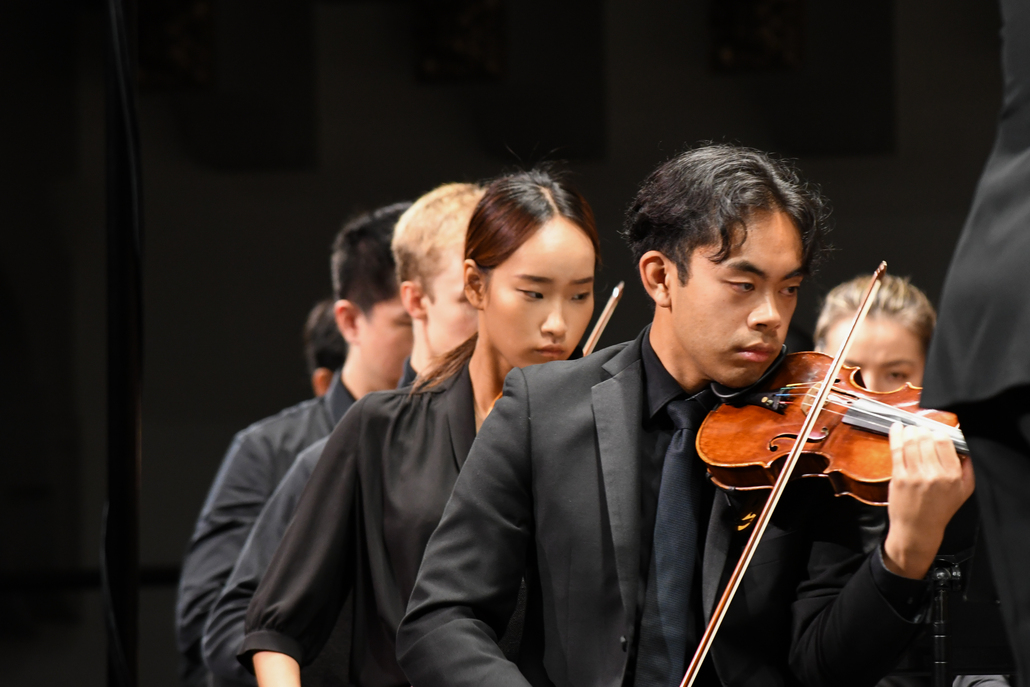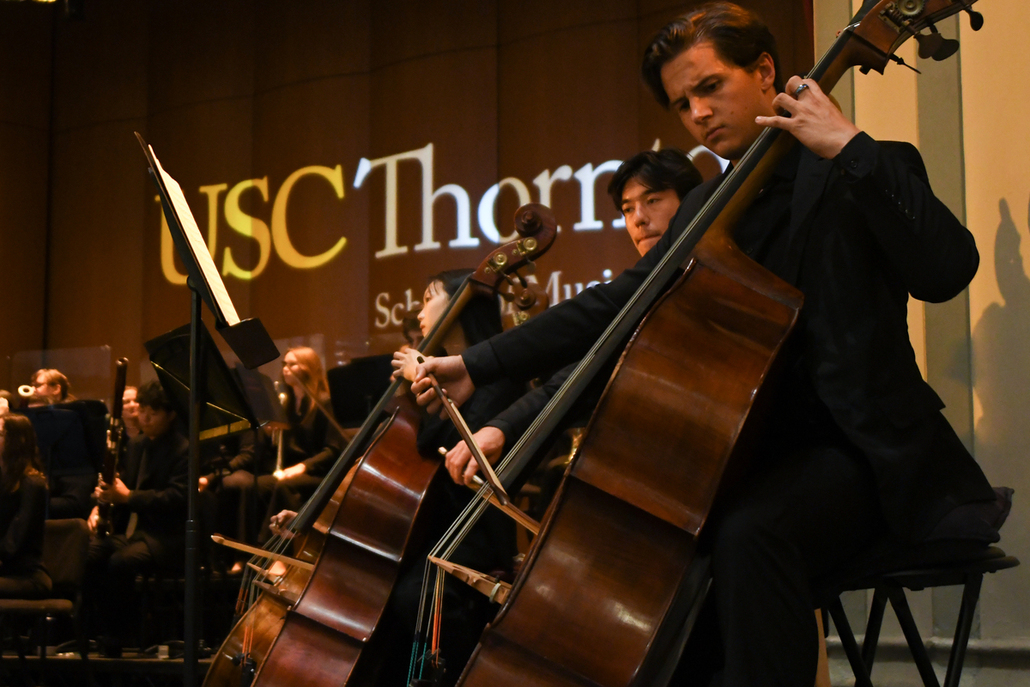Thornton Symphony hosts fall debut
USC’s Bovard Auditorium welcomed music lovers for a lovely student performance.
USC’s Bovard Auditorium welcomed music lovers for a lovely student performance.

A rumbling could be felt in the audience. Then, the sound of chatter came to a halt as concert attendees held their breath in anticipation for the first notes of the opening piece the USC Thornton Symphony had in store Friday evening.
Music lovers from all over the USC community gathered Sept. 8 to witness the opening concert of the fall semester by the symphony in Bovard Auditorium.
The venue was filled with friends and family of orchestra members who were eager to watch their loved ones perform. Seated in the audience as well were USC students supporting their friends and peers.
“I play violin, so I’ve been in a few orchestras myself,” said Ameli Llumiquinga Lapham, a freshman majoring in contemporary Latino and Latin American studies. “I just really look forward to seeing how the other musicians perform.”
The orchestra was led by resident conductor Sharon Lavery, who took great care to choose a repertoire for the performance that represented the beginning of a new era at Thornton School of Music, especially with the concert’s opening piece, “Fanfare for Flora,” written by former Thornton associate dean Douglas Lowry.
“[“Fanfare for Flora”] was written for Flora Thornton who, because of her generosity, is the reason why we have the Thornton School of Music name,” Lavery said. “The piece reflects her great spirit and energy.”
Lavery also chose the piece to celebrate the Thornton School of Music’s new Dean, Jason King, who was in attendance and publicly recognized Friday evening.
The concert itself began on a grand note, with the initial blare of the trumpets at the beginning of the piece to signify celebration.
The piece brought forth a magnificently vibrant energy into the halls of the auditorium. Having purposeful moments of slowness, the orchestra interpreted the music with a distinct elegance that made one imagine being in attendance at a celebratory parade.
Following “Fanfare for Flora,” Lavery welcomed Thornton professor of practice and composer Veronika Krausas to the stage to introduce the next piece, “Caryatids,” composed by Krausas herself.
“Our long-standing faculty member Veronika Krausas is turning 60 this year, which is an important event for her,” Lavery said. “I had heard great things about this piece from some of my colleagues who are in the L.A. [Philharmonic], and I know how important it is for our students to work on and experience new contemporary music.”
Originally premiering in 2021, Krausas was commissioned by the Detroit Symphony Orchestra to compose “Caryatids” for the 10th Annual Elaine Lebenbom Memorial Award for Female Composers.
“I was trying to base [“Caryatids”] on something in Detroit,” Krausas said. “There is a building there called Book Tower, which has these caryatids that are these women sculptures upholding the roof.”
The piece is structured in eight sections like the architecture of a building, with four sections representing the corners and another four sections interspersed representing the walls.
“The four corners are the structural chordal parts,” Krausas said. “The four walls are the dance movements, because the maidens would dance. They’re my reinterpretation of what a Baroque dance might be.”

Listening to “Caryatids” for the first time, audience members could distinctly recognize the ending of one section and the beginning of the next. The “corner” sections brought hard-hitting, thunderous notes that would mark a structural change in the piece. Then, the “wall” sections were more playful, and explored the light-hearted essence of Baroque-inspired sounds.
Perfecting the new piece for the Friday performance, however, was a difficult yet satisfying journey for the USC Thornton Symphony.
“The first rehearsal was quite rough,” Lavery said. “This is common with new works because the students had never heard it before. So, they were definitely up for the challenge.”
Krausas was especially thrilled to have her original piece featured in Friday’s performance.
“You could have two actors saying the same thing, and it’s almost identical, but it’s not that one is better or worse,” Krausas said. “I love that excitement of hearing my piece done by someone else and having its own little bit of character difference.”
Without intermission, the USC Thornton Symphony concluded the evening with all four movements of “Symphony #5 in E minor, Opus 64” by Pyotr Ilyich Tchaikovsky, one of Lavery’s “favorite symphonies in all of the entire classical music repertoire.”
Each movement of the piece brought its own specific emotion that the audience could recognize and feel as they listened to it.
For Lavery, the connection the students have with Tchaikovsky’s music is just as important as the connection the students have with each other.
“It’s a piece that is important for the students to experience and learn,” Lavery said. “Tchaikovsky is difficult in an emotional way in pacing [and] in style. It’s getting the ensemble to work together … using their ears, let alone not focusing on my baton.”
The orchestra had only been in rehearsals for two weeks in preparation for the Friday performance, but had made an astounding amount of progress in that short amount of time.
“It’s nothing short of amazing,” Lavery said. “These students inspire me. I know it’s supposed to be the other way around but not when they can do the kind of work that they’ve done over the past two weeks. Extraordinary. Excellent.”
The evening came to a close as the entire auditorium gave the performers a standing ovation for a job well done following the finale.
“The whole concert offers a wide range of emotions,” Lavery said. “[It’s] our job as musicians to create reactions, feelings and emotions, good or bad, but to create those reactions by performing the works of great composers.”
We are the only independent newspaper here at USC, run at every level by students. That means we aren’t tied down by any other interests but those of readers like you: the students, faculty, staff and South Central residents that together make up the USC community.
Independence is a double-edged sword: We have a unique lens into the University’s actions and policies, and can hold powerful figures accountable when others cannot. But that also means our budget is severely limited. We’re already spread thin as we compensate the writers, photographers, artists, designers and editors whose incredible work you see in our daily paper; as we work to revamp and expand our digital presence, we now have additional staff making podcasts, videos, webpages, our first ever magazine and social media content, who are at risk of being unable to receive the compensation they deserve.
We are therefore indebted to readers like you, who, by supporting us, help keep our paper daily (we are the only remaining college paper on the West Coast that prints every single weekday), independent, free and widely accessible.
Please consider supporting us. Even $1 goes a long way in supporting our work; if you are able, you can also support us with monthly, or even annual, donations. Thank you.
This site uses cookies. By continuing to browse the site, you are agreeing to our use of cookies.
Accept settingsDo Not AcceptWe may request cookies to be set on your device. We use cookies to let us know when you visit our websites, how you interact with us, to enrich your user experience, and to customize your relationship with our website.
Click on the different category headings to find out more. You can also change some of your preferences. Note that blocking some types of cookies may impact your experience on our websites and the services we are able to offer.
These cookies are strictly necessary to provide you with services available through our website and to use some of its features.
Because these cookies are strictly necessary to deliver the website, refusing them will have impact how our site functions. You always can block or delete cookies by changing your browser settings and force blocking all cookies on this website. But this will always prompt you to accept/refuse cookies when revisiting our site.
We fully respect if you want to refuse cookies but to avoid asking you again and again kindly allow us to store a cookie for that. You are free to opt out any time or opt in for other cookies to get a better experience. If you refuse cookies we will remove all set cookies in our domain.
We provide you with a list of stored cookies on your computer in our domain so you can check what we stored. Due to security reasons we are not able to show or modify cookies from other domains. You can check these in your browser security settings.
These cookies collect information that is used either in aggregate form to help us understand how our website is being used or how effective our marketing campaigns are, or to help us customize our website and application for you in order to enhance your experience.
If you do not want that we track your visit to our site you can disable tracking in your browser here:
We also use different external services like Google Webfonts, Google Maps, and external Video providers. Since these providers may collect personal data like your IP address we allow you to block them here. Please be aware that this might heavily reduce the functionality and appearance of our site. Changes will take effect once you reload the page.
Google Webfont Settings:
Google Map Settings:
Google reCaptcha Settings:
Vimeo and Youtube video embeds:
The following cookies are also needed - You can choose if you want to allow them:
